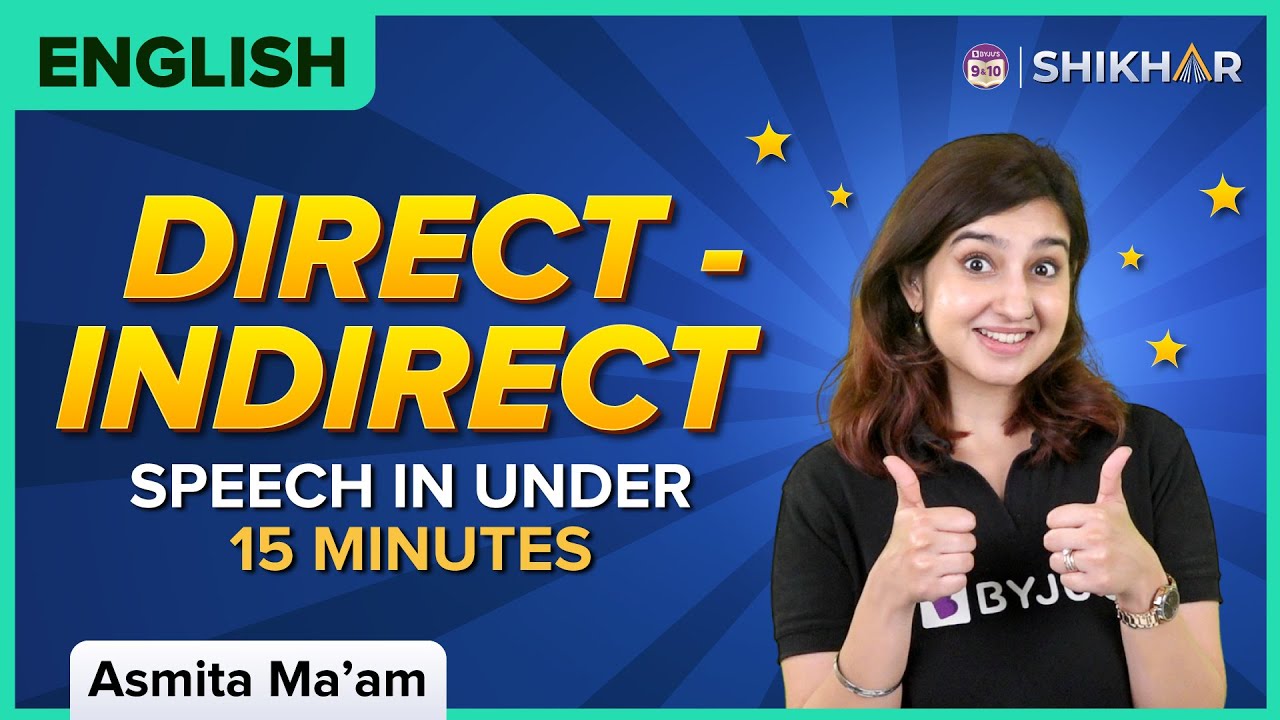Reported Speech
Summary
TLDRThis video explains the difference between direct and reported (indirect) speech, emphasizing how to correctly convert one to the other. It covers changes in tense, pronouns, and time expressions, such as present tense shifting to past tense, and provides various examples for clarification. The video also highlights how to report yes/no questions and other types of questions. Lastly, it notes that tense changes may not be necessary if the statement remains true. This guide helps viewers understand how to report speech accurately in English.
Takeaways
- 😀 Direct speech involves quoting someone's exact words, like 'Diane said, I am happy today.'
- 😀 Reported speech involves rephrasing someone's words, like 'Diane said that she was happy that day.'
- 😀 When converting direct speech to reported speech, the tense often changes, e.g., present tense to past tense.
- 😀 For example, 'She said, I am tired' becomes 'She said that she was tired' in reported speech.
- 😀 The present perfect in direct speech changes to the past perfect in reported speech, e.g., 'I have seen snow' becomes 'He said that he had seen snow.'
- 😀 The present continuous in direct speech changes to past continuous in reported speech, e.g., 'We are listening' becomes 'The children said that they were listening.'
- 😀 In reported speech, pronouns often change, e.g., 'I' becomes 'he/she' or 'they'.
- 😀 When changing direct speech to reported speech, time expressions also change, like 'tomorrow' to 'the next day'.
- 😀 For yes/no questions in reported speech, 'if' is used, and verbs change from present to past, e.g., 'Can you help?' becomes 'He asked if I could help.'
- 😀 For questions that are not yes/no, the subject and verb order doesn't change, e.g., 'What is your name?' becomes 'She asked what my name was.'
Q & A
What is the main difference between direct speech and reported speech?
-Direct speech quotes the exact words of the speaker, while reported speech paraphrases the speaker's words. In reported speech, the tense often changes.
How do we convert present tense in direct speech to reported speech?
-When converting present tense in direct speech to reported speech, we typically change the verb to the past tense. For example, 'I am tired' becomes 'She said that she was tired.'
What happens to the present perfect tense when it is converted into reported speech?
-The present perfect tense in direct speech changes to the past perfect tense in reported speech. For example, 'I have seen snow' becomes 'He said that he had seen snow.'
What is the change when converting the present continuous tense to reported speech?
-The present continuous tense in direct speech changes to the past continuous tense in reported speech. For example, 'We are listening' becomes 'They said that they were listening.'
What happens to the pronoun when direct speech is reported?
-The pronoun usually changes to reflect the perspective of the reporting person. For example, 'I fell down the stairs' becomes 'He said that he had fallen down the stairs.'
How do we change time expressions like 'tomorrow' in reported speech?
-Time expressions in direct speech often change in reported speech. For instance, 'tomorrow' becomes 'the next day,' and 'next week' becomes 'the following week.'
How is 'will' converted in reported speech?
-'Will' changes to 'would' in reported speech. For example, 'I will call you tomorrow' becomes 'He said that he would call me the next day.'
How do we report yes/no questions in reported speech?
-For yes/no questions, we use 'if' to introduce the reported speech, and the verb usually changes. For example, 'Can you help me?' becomes 'He asked if I could help him.'
How do we report questions that are not yes/no questions?
-For questions that are not yes/no, we report them without switching the subject and verb, and we don't use 'if.' For example, 'What is your name?' becomes 'She asked what my name was.'
Is it always necessary to change the tense in reported speech?
-No, it isn't always necessary to change the tense in reported speech if the statement is still true. For example, 'I am a teacher' remains 'She is a teacher' when reported.
Outlines

Dieser Bereich ist nur für Premium-Benutzer verfügbar. Bitte führen Sie ein Upgrade durch, um auf diesen Abschnitt zuzugreifen.
Upgrade durchführenMindmap

Dieser Bereich ist nur für Premium-Benutzer verfügbar. Bitte führen Sie ein Upgrade durch, um auf diesen Abschnitt zuzugreifen.
Upgrade durchführenKeywords

Dieser Bereich ist nur für Premium-Benutzer verfügbar. Bitte führen Sie ein Upgrade durch, um auf diesen Abschnitt zuzugreifen.
Upgrade durchführenHighlights

Dieser Bereich ist nur für Premium-Benutzer verfügbar. Bitte führen Sie ein Upgrade durch, um auf diesen Abschnitt zuzugreifen.
Upgrade durchführenTranscripts

Dieser Bereich ist nur für Premium-Benutzer verfügbar. Bitte führen Sie ein Upgrade durch, um auf diesen Abschnitt zuzugreifen.
Upgrade durchführenWeitere ähnliche Videos ansehen

Direct - Indirect (Reported) Speech in Under 15 Minutes | Class 9 and 10 | English | BYJU'S

REPORTED SPEECH | INDIRECT SPEECH | DIRECT SPEECH - statements, questions, commands

BAHASA INGGRIS SMA - Reported Speech (Indirect & Direct Speech) | GIA Academy

Learn English Grammar: INDIRECT SPEECH (REPORTED SPEECH)

REPORTED SPEECH - PENGGUNAAN DIRECT AND INDIRECT SPEECH - RUMUS DAN CONTOH

Reported Speech for Advice, Commands, and Requests
5.0 / 5 (0 votes)
